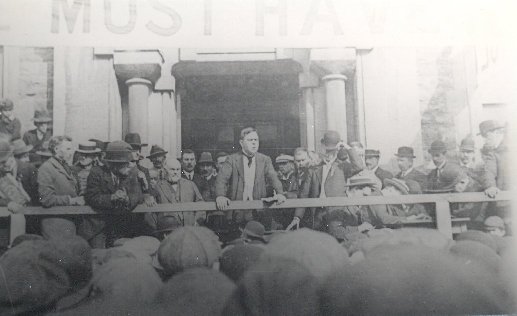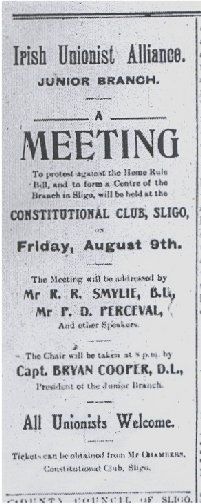Sligo 1912 - Sligo Poets
Main menu:
- Home
-
1912
- 1912
- Sligo Poetry 1912
-
1913
- 1913
- Sligo Poetry 1913
-
1914
- 1914
- Sligo Poetry 1914
-
1915
- 1915
-
Sligo Poetry 1915
- Sligo Newspaper Poems
- Sligo Champion
- Sligo Independent
- Sligo Nationalist
-
1916
- 1916
-
Sligo Poetry 1916
- Sligo Newspaper Poems 1916
- Sligo Champion
- Sligo Nationalist
- Sligo Independent
- The Poets
- Bibliography
- The Author
County Sligo 1912
Sligo in 1911 it ranked twenty-
The population of Sligo town had increased by 2.7% between 1901-
Railways linked Sligo to Dublin, Belfast, Limerick and Galway. Sligo port, the most important in the north-

Above: North Sligo MP Thomas Scanlan speaking at a Home Rule meeting at Sligo Town Hall on Sunday 7 Sept. 1913. The banner reads: We must have Home Rule.
The reforming Local Government Act of 1898 established Sligo County Council, Sligo Corporation and four Rural District Councils, Sligo, Tubbercurry, Dromore West and Boyle No. 2.
The extension of the franchise meant that members elected were predominately nationalist.
Sligo Corporation’s finances were in a precarious state and workers’ housing as well as the streets and roads were in poor condition.
Non-
These included Belfast-
The Protestants of Sligo were strong in their public opposition to the 1912 Home Rule Bill. Sligo branches of the Irish Unionist Alliance, the Junior Unionist Alliance and the Women's Unionist Alliance were formed in the county and held regular public meeting which got widespread coverage in the local newspapers. Major Bryan Cooper, a former MP for South Dublin, was to the fore in organising these groups.
In the first decade of the twentieth century nationalist Sligo was loyal to the re-
Membership of the UIL was essential for anyone seeking office as it controlled all public bodies. Weekly columns of UIL branch reports in the local press detailed their concerns which were often agrarian and local, and included regular motions of confidence in the party and the leadership.
The UIL continued to agitate to force landlords to sell estates and give up grazing ranches. The Birrell Land Act (1909) granted the Congested Districts Board (CDB) compulsory purchase powers and increased its budget substantially leading to accelerated land purchase. It also extended the areas classified as ‘congested’ to include all County Sligo.

A Sligo Trades Council existed since the late 1890s and had campaigned for fair labour conditions and local industry. The UIL supported it from the beginning. In September 1911 a Sligo ITGWU branch was founded at a public meeting chaired by the Mayor, Daniel O’Donnell, and addressed by Walter Carpenter an ITGWU organizer. Dock worker and sailor, John Lynch, became the secretary of the branch which was soon one of the most active in the country.